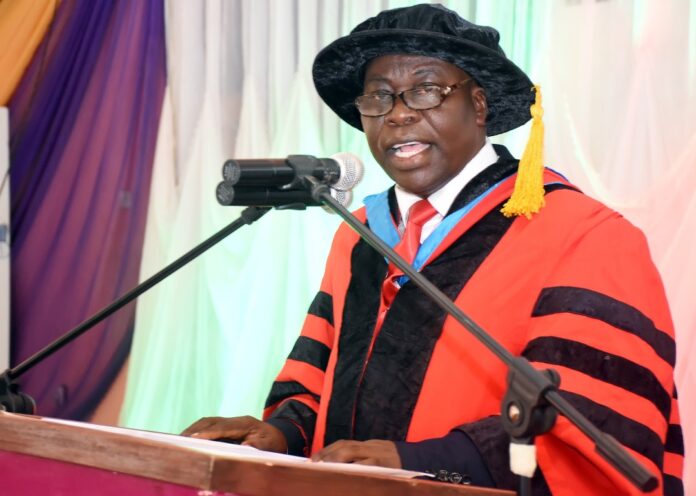
A Professor of Philosophy, Benson Monehin Akinnawonu, says in order to foster African development through indigenous knowledge, conscious efforts must be made to salvage the endangered African indigenous languages and knowledge from drifting into oblivion.
Prof. Akinnawonu, on Tuesday, February 9, 2021, gave the submission while delivering the 16th Inaugural Lecture of Adekunle Ajasin University, Akungba Akoko, Ondo State, Nigeria, entitled, “The Philosophic Spirit in the Quest for African Sustainable Development and the Imperative of Indigenous Knowledge Forms”.
The Inaugural Lecturer also submitted that the skewed and deviant behaviours that are today prevalent among youths in Africa were partly attributed to the unfortunate decline in Africans awareness of the place and importance of proverbs in the literary and social life of the people of the continent.
He said, “The growth and preservation of indigenous knowledge of all kinds for the purpose of development must be given priority attention if Africa must progress among the Comity of Nations. All the branches of human knowledge, especially the sciences and the humanities, that evolved from natural philosophy, must by necessity appreciate the cultivation of the philosophic spirits of rationality and enquiry which are the hallmarks of human intellectual development”.
Prof. Akinnawonu stressed the need for recognition of Philosophy across all levels of education and its inclusion in the core sciences in order to address the problem of value deficits across the globe and integrate capacity for enquiry, critical thinking and sense of morality.
According to him, “Government’s focus in the education sector should not only be directed to the core sciences i.e., Science, Technology, Engineering and Mathematics (STEM), philosophy should be incorporated in order to integrate capacity for enquiry, critical thinking and sense of morality in the school’s curriculum. A modified STEM is, therefore, proposed called STEMP where P represents Philosophy”.
Prof. Akinnawonu, who labelled as misgivings the assumption by some people that studying philosophy does not guarantee job placement, described philosophy as an important discipline whose value both to the individual and the society cannot be underestimated without grave consequence, and advised governments, proprietors and other stakeholders in the education sector to exercise caution in their curricular review decisions not to undermine the relevance or the important value of philosophy to nation building and sustenance of the good life.
He noted the conscious efforts made by philosophers in Africa in justifying the existence and status of African philosophy necessitated his deep focus on the critical examination of some selected African beliefs, juxtaposing them with western paradigms.
He noted that cultivation of the philosophic spirit has become imperative to human survival and society’s advancement, stressing that philosophy has been the foundation of all universal principles.
He said, “Rather than denigrating the discipline of Philosophy, all other disciplines should engage in research collaborations with those in philosophy for the advancement of knowledge. A river that forgets its source will definitely dry up. This is presumably the reason why things have fallen apart in the continent of Africa.”
While arguing the need to jettison some aspects of the traditional culture that are anachronistic and lacking the requirements of rigour and rationality as available in the western culture, the Professor of Philosophy advocated the revival of “our traditional moral values through the promotion and development of our rich indigenous knowledge forms.”
He lamented the negative impact of globalization in the area of information technology on the youth, including violent songs which are capable of increasing hostile feelings and aggressive thought, calling on the regulatory bodies such as the National Censor’s Board (NCB), to focus more on censoring and regulating the nation’s system of communication.
“The declining learning and use of the indigenous languages among African youths call for concern. What Africans need to do, therefore, is to develop the right attitude towards preserving the continent’s rich cultural heritage, identifying the various categories of indigenous knowledge, promote them and adapt them as basis for African development.
Prof. Akinnawonu, who posited that proverbs were full of hidden meanings accepted by Africans as expression of truth and wisdom, added that the preservation and improvement of indigenous folklores would also provide a veritable channel for cross cultural comparisons and knowledge sharing.
The Inaugural Lecturer noted that proverbs form a great part of a peoples’ traditional repository of what they consider to be of great value and concern to them. He observed with dismay that many indigenous languages in Africa, particularly Nigeria, were endangered with extinction.
In the same vein, Prof. Akinnawonu, lamented that the ignoble African Time Syndrome has emerged as one of the major problems confronting the continent in its quest for development. He said an earlier research carried out by him on African and Western concepts of time showed that the attitude of Africans toward time keeping is a function of the subjective nature of their time reckoning.
He said, “African’s attitude toward time keeping is a function of the subjective nature of their time reckoning which has become inherent trait of African consciousness. This has manifested in African’s inability to keep appointments. This trend tends to tempt people into believing that Africans are not time conscious. “
He said the genuine liberation and development of Africa cannot be attained unless it is based on a critical analysis of the traditional conceptual schemes that are typical of African society.
Speaking earlier the Acting Vice Chancellor, Prof Olugbenga Ige, had highlighted some of the key areas that Prof. Akinnawonu had served the University in his three decades of teaching career. He said Prof. Akinnawonu, who was among the staff that relocated with the University from Ado-Ekiti to Akungba Akoko in 1999, had served in various capacities, including acting and substantial Head of Department of Philosophy; acting and substantial Dean of Faculty of Arts; and presently serving as the Director of Academic Planning of the University and a member of the Governing Council of the University.















